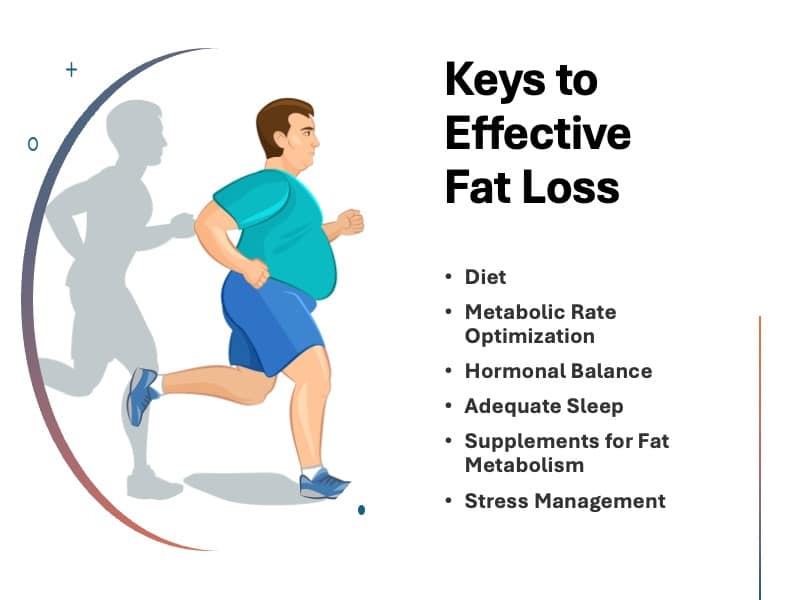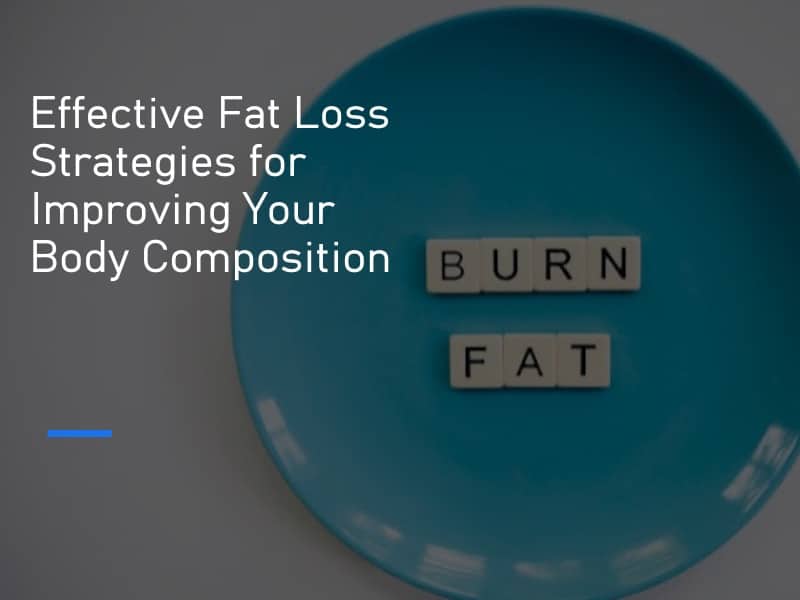Effective Fat Loss Strategies to Help You Improve Your Body Composition
Effective fat loss strategies go far beyond simply working out at the gym.
While regular physical activity plays a vital role in body composition, lasting fat loss is best achieved through a holistic, science-backed approach that also includes proper nutrition, stress management, metabolic optimization, hormonal balance, and restorative sleep.
Understanding how each of these components works together empowers you to lose fat more efficiently and maintain long-term results.
Emerging research in exercise science and nutrition consistently highlights that successful fat loss requires consistency in multiple lifestyle areas, not just calorie-burning workouts (Hall et al., 2012).
For example, poor sleep can disrupt the regulation of hunger-regulating hormones, such as ghrelin and leptin, making it more challenging to control food intake (Spiegel et al., 2004).
Similarly, unmanaged stress can elevate cortisol levels, prompting the storage of abdominal fat, even in physically active individuals.
When combined with smart supplementation and behavioral changes, these effective fat loss strategies can help you build a leaner, healthier body while supporting total wellness.
Keys to Effective Fat Loss

Working out helps burn fat, but there are additional factors to consider.
Losing body fat is determined by the level of metabolism, hormones, the type of diet, stress, and sleep quality.
Working out alone may not be effective unless the other factors are taken care of.
For an effective fat-burning process, try these important strategies.
- Good sleep habits are necessary for the regulation of hormones.
- Keep stress at a minimum to reduce the possibility of extra fat.
- Do not forget that having a healthy diet and exercising go hand in hand.
Following the best fat loss strategies can help you achieve your goal quicker.
The Role of Diet in Fat Burning
A well-balanced diet is a cornerstone of effective fat loss strategies because it directly influences hormonal balance, metabolic rate, and overall energy balance.
While exercise burns calories, your daily nutrition choices determine whether your body is primed to store fat or burn it efficiently.
To support fat burning, prioritize meals that include lean protein sources (such as chicken, fish, or legumes), healthy dietary fats (like olive oil, avocado, or nuts), and complex carbohydrates (including sweet potatoes, oats, or quinoa).
These macronutrients work synergistically to stabilize blood sugar, reduce cravings, and sustain energy throughout the day.
Protein intake, in particular, plays a critical role in preserving lean muscle mass during weight loss.
Since muscle tissue burns more calories at rest than fat tissue, maintaining muscle through high-protein meals supports a higher resting metabolic rate (Pasiakos et al., 2015).
Meal timing can also impact fat loss.
Consuming balanced meals spaced regularly throughout the day helps prevent overeating, supports insulin regulation, and keeps metabolism active.
Additionally, staying well-hydrated boosts digestive efficiency and may modestly increase metabolic rate by supporting thermogenesis and waste elimination.
Nutrient-dense, strategically timed meals, paired with adequate hydration, form one of the most effective fat loss strategies for long-term success.
Metabolic Rate Optimization
Working on your metabolism is a great way to accelerate fat loss. It is one of the effective fat loss strategies.
Any increase in your metabolism makes it easier to burn calories when your body is not very active.
There are several ways to increase your metabolism naturally.
- Working out with weights makes your muscles increase, and this boosts the number of calories you burn even when resting.
- Eating adequate amounts of protein increases the calories burned during the process of digestion.
- Making small efforts, such as walking, using the stairs, or standing up now and then during the day, will help you burn many more calories.
Brands like Vitauthority create supplements, such as Thermo Burn, which can provide a small yet significant increase to an individual’s metabolic rate.
Hormonal Balance for Fat Burning
Hormones play a central role in fat loss.
When balanced, they help your body burn fat more efficiently.
But when disrupted, due to poor diet, stress, or lack of sleep, fat loss becomes much harder, especially around the midsection.
- Insulin helps regulate blood sugar and fat storage.
- Chronically high insulin levels can promote fat gain, particularly in the belly area. Eating lean proteins, fiber-rich vegetables, and complex carbs helps keep insulin stable.
- Cortisol, the stress hormone, rises with chronic stress and encourages fat storage around the waist.
- Managing stress through walking, breathing exercises, or mindfulness can help lower cortisol and support fat loss.
- Thyroid hormones control metabolism, and imbalances can significantly slow fat burning.
- Supporting thyroid health with sufficient sleep, adequate nutrients like iodine and selenium, and reduced stress is crucial.
Balancing these hormones is one of the most effective fat loss strategies because it helps your body naturally burn fat instead of storing it.
Role of Sleep in Weight Management
A sleep-deprived person has a hard time burning body fat.
Scientists have found that poor sleep may lead to increased body fat, reduced muscle mass, and imbalanced hormonal levels.
In deep sleep, your body carries out important activities that assist your recovery, rebuilding, and burning of fats.
Having little sleep may increase cortisol levels, which trigger your body to store fat in your belly area.
Insufficient sleep has been known to cause an excess production of the hormone, which leads to eating foods higher in calories.
Ensure you get 7-9 hours of sleep each night to support your efforts to lose fat.
By resting, your hormones will be able to perform their jobs and encourage your body to burn fat effectively by applying the best fat-loss strategies.
Supplements for Fat Metabolism
Besides other fat loss strategies, such as diet, exercise, and making healthy changes, supplements can also aid in metabolizing fat.
Several supplements can help in the process of fat metabolism.
- Green Tea Extract: It contains catechins that aid in fat breakdown, which is why it appears in many supplements designed to help people burn fat.
- Caffeine: It is found in coffee and many fat-burning supplements, helping to boost metabolism temporarily.
- L-Carnitine: It helps take your fatty acids into the cells to be eliminated for energy, and this may increase fat burning.
- Conjugated Linoleic Acid (CLA): It is a kind of healthy fat in meat and dairy, as it has been linked to loss of body fat and enhancement of lean muscle mass.
Stress Management and Fat Storage
Chronic stress is a hidden barrier to fat loss.
Elevated cortisol, the body’s primary stress hormone, promotes fat storage, especially in the abdominal region, and makes it harder to burn fat efficiently.
Incorporating stress-relieving practices, such as deep breathing, walking, meditation, or even gentle swimming, can help lower cortisol levels and increase your metabolism.
Managing stress not only improves mental well-being but also improves your body’s ability to shed fat.
For truly effective fat loss strategies, incorporating stress management into your daily routine is essential.
Final Thoughts: How to Combine the Most Effective Fat Loss Strategies in Your Routine
Successful fat loss isn’t about chasing quick fixes; it’s about making consistent, healthy choices across every area of your life.
By combining movement, smart nutrition, quality sleep, hormonal balance, and stress management, you create an internal environment that naturally supports fat burning.
Even small daily changes, such as walking more, eating balanced meals, or establishing a regular sleep schedule, can lead to lasting results over time.
The most effective fat loss strategies work best when applied together with patience and consistency.
To further support your journey, consider targeted supplements from trusted brands like Vitauthority, which can complement your efforts and help you make healthy choices every step of the way.
This website does not provide medical advice. This website site does contain affiliate links, and purchases may earn a commission.
Read my Medical Disclaimer, Review Disclaimer, and Publishing Policies for more details. Use of this site indicates acceptance of these terms.



